#Charles Cornwallis
Explore tagged Tumblr posts
Text
Comic Sans Valentines: British of the American Revolutionary War Edition



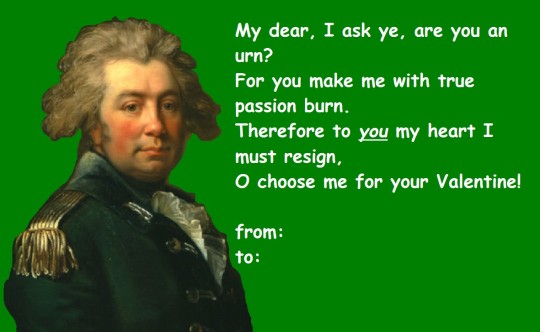


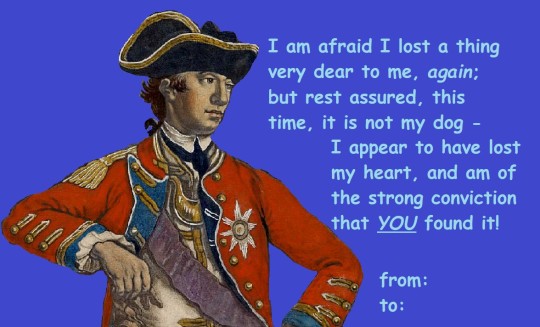
#there goes another round full of misappropriated quotes and deliberately terrible editing for the sake of comedic effect#american revolutionary war#18th century#history#history humour#utter nonsense#american revolution#amrev#american war of independence#benedict arnold#john andre#charles cornwallis#john graves simcoe#john burgoyne#henry clinton#william howe#comic sans valentines#valentines day
96 notes
·
View notes
Text
Cruelty, Compassion, and British Privates in The Patriot
It's astounding that there's anything left in this film that I haven't discussed, but I find that I've said almost nothing about how British soldiers who are not officers are represented in The Patriot. In my defense, there are barely any instances of anyone in the film talking about them either. In the longest piece of dialogue in the script, General Cornwallis and Benjamin Martin focus on the officers Martin kills so exclusively one might expect to see him sparing the men of no rank he and his men encounter. Except we know he does not do that; in fact, the suffering of those men is even greater than that of the more privileged men leading them. Martin's orders are to target the officers first, so the men shot in their faces while begging for their lives? Privates. The men Martin hacks to death with his tomahawk after his sons shoot all the officers? Privates. After the Maroons of Gullah Island, British privates are the most visible silenced group in the film.
While Martin's brutality to privates goes under the radar of most viewers, Tavington's to colonial soldiers is impossible to miss. Not only does Gabriel report on his killing surrendering men at the Battle of Camden, but he we see him do it in his very first scene in the film. He is even quite callous in his treatment of officers on his own side. When General O'Hara points out at the prisoner exchange that attacking Martin threatens officers' lives, his response is essentially, I don't care about those heifers. They shouldn't have gotten themselves captured! "With all respect, Sir, he's killed as many officers in the past two months. He rolls his eyes scornfully when the lieutenant who has arrived at the Martin farm first does not know the origins of a marked case delivered directly into Tavington's hand. He even snaps at one of his own officers for interrupting his interview with the wounded survivor of Martin's attack by answering the questions for him.
What's interesting, though, is that none of Tavington's shortness is visited on the wounded private himself. Instead, he introduces himself, including the sole utterance of his first name in the film, and gently urges the man to "calm down" when he begins to get agitated. The only person he treats with similar congeniality is General Cornwallis himself. That is not necessary. The private is not a fly he has to catch with honey; he is this man's superior in rank several times over. What makes this scene doubly interesting is that it is the only case of anyone, on either side, speaking to a British private directly.
I hardly think it is intentional on the filmmakers' part to present a softer side of Tavington. I think they were so preoccupied with contrasting British "gentlemen" and Colonial "rustics" that they simply forgot that the overwhelming majority of British soldiers who fought and died in the American Revolution were as far from being gentlemen by Cornwallis's definition as possible. So, of course it slipped under their radar that Tavington's first order, that the British wounded to be taken to their surgeons before he orders the executions of the Colonial ones, is about protecting British lives regardless of rank. His final order, an attempt to stop his men from charging into the Continental Army's trap, is about the same thing. If he cared only about his own agenda--as Cornwallis does when he sends in the rest of his army to stop Tavington from stealing his glory--he would have just continued his pursuit of Martin. A moment that is clearly meant to register as Tavington finally being punished for his hubris actually features Tavington trying to spare his men, even if it is likely too late. He does not forget abut them, even if the filmmakers do.
Considered from this position, the exchange between O'Hara and Tavington looks quite different. Beneath the obvious contrast of the "real" gentleman concerned with honor and the brutal thug concerned only with his own advancement is another. O'Hara and Cornwallis value the lives of these nineteen officers more highly than those of all the men the militia under Martin have killed, and all those they'll kill once they've been set free. It is classism masquerading as compassion. Meanwhile, Tavington, who has been obsessed with catching "the Ghost" since the wounded private attributed twenty British deaths to him, recognizes Martin and is immediately taking off his helmet, pulling out his sword. Square up, Farmer Ben!
The framing of Martin as a man of compassion hinges on erasing the experience of the British privates he brutalizes. Framing Tavington as a cruel butcher hinges on erasing the experience of the British privates he seeks to protect or avenge. It's almost as though being compassionate to soldiers on your own side and cruel to soldiers on the other side is just how war works, or something. But that's nonsense, of course. Tavington is cruel to Patriots in a film titled The Patriot, so it hardly matters whether he cares for his own men or not. Still, if I were a British private, I'd consider it an honor to hold his helmet while he kicked Benjamin Martin's ass.
19 notes
·
View notes
Text
The world turned upside down
On this day in history: October 19th, 1781. Charles Cornwallis surrendered to the combined troops of George Washington and the patriots French allies. Symbolically raising a white handkerchief and giving up a sword to Washington as a sign of civil surrender. Famously when the sword was offered to the French, they refused saying, “we are subordinate to the Americans now.” Famously, Alexander Hamilton and John Laurens had stormed the the English silently by force the previous night. Amongst other heroes, holding position in case Laurens and Hamilton need retreat, was the 2nd continental light dragoons, better known to some as “Sheldon’s horse” or “Benjamin Tallmadge’s unit.” Famously, ill or humiliated, all the English showed up to formally surrender, expect Banastre Tarelton and Cornwallis himself. Legend has it, though the historical records never say, the English played the famous folk song (dating about to 1646) titled “When the King enjoys his own” perhaps more aptly titled in this scenario “the world turned upside down.”



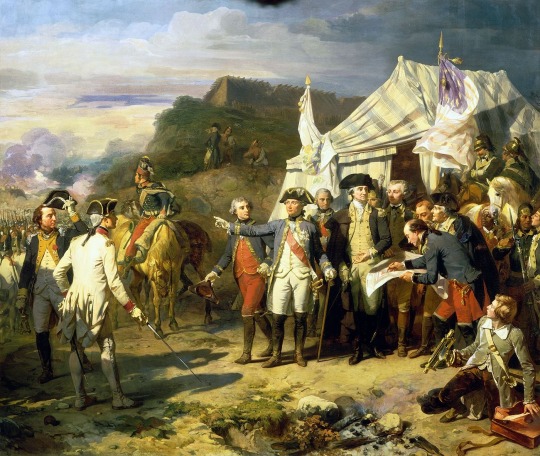
youtube
Yorktown: PBS.
Mount Vernon: Yorktown.
Siege of Yorktown by Henry Freeman.
Hamil-film: Yorktown.
#battle of Yorktown#on this day in history#history#18th century#american revolution#18th century history#meerathehistorian#george washington#charles cornwallis#marquis de lafayette#1780s#john laurens#historical alexander hamilton#historical john laurens#historical lams#benjamin tallmadge#ben tallmadge#banastre tarelton#turn: washington's spies#turn amc#amc turn#turn washington's spies#queue are made by history
37 notes
·
View notes
Note
Best real-world political figure appearance? (Queen Elizabeth and Obama are the only ones I can remember)

Fictionalised Versions of real political leaders appeared across multiple episodes of Legends, whose apperance did you enjoy most?
This was another fun one to do thank you for the suggestion Anon (and sorry it took so long to do). These are all of the ones that I could find but I'm sure I might have missed some.
#barak obama#queen elizabeth ii#richard nixon#george washington#lb johnson#ulysses s grant#julius caesar#charles cornwallis#I cannot believe I am tagging an Arrowverse post with these names#randall batinkoff#gwenda lorenzetti#paul ganus#lovell adams-gray#peter hall#simon merrells#noel johansen#eleanor roosevelt
3 notes
·
View notes
Text
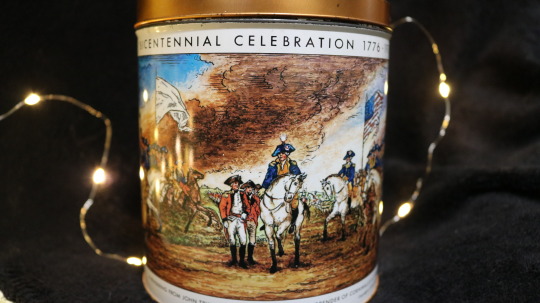
#1990s#90s aesthetic#90s#etsyfinds#etsy#etsyseller#etsyshop#collectibles#collection#70s#1970s#home decor#decoration#decor#interior#patriotic#stars and stripes#patriotism#bicentennial man#fathers day#fathers day gift#historical#history#charles cornwallis#art history#culture#home decoartion
7 notes
·
View notes
Text
Lord Cornwallis's Abilities are to me More Alarming than His Superiority of forces. I Ever Had a Great opinion of Him. Our Papers Call Him a Mad man But was Ever any Advantage taken of Him where He commanded in Person? To Speak Plain English I am Devilish Affraid of Him
The Marquis de La Fayette to Henry Knox, August 18, 1781
Idzerda Stanley J. et al., editors, Lafayette in the Age of the American Revolution: Selected Letters and Papers, 1776–1790, Volume 4, April 1, 1781–December 23, 1781, Cornell University Press, 1981, p. 333.
#quote#letter#marquis de lafayette#la fayette#french history#american history#american revolution#history#henry knox#1781#charles cornwallis
18 notes
·
View notes
Text
She mourns (...) her faithful Pitt
This very ... patriotic, poem was published by The Gentleman’s Magazine in early 1806. It was written by the anonyms “B” to commemorate all the changes the end of 1805 and the begin of 1806 brought to the nation. While I find some of the stanzas a bit … questionable, some passengers sound rather nice.
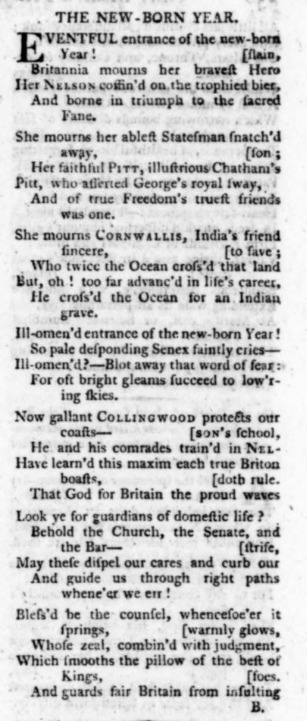
The New-Born Year Eventful entrance of the new-born Year! Britannia mourns her bravest Hero Slain, Her NELSON coffin’d on the trophied bier, And borne in triumph to the sacred Fane. She mourns her ablest Statesman snatch’d away, Her faithful PITT, illustrious Chatham’s Son; Pitt, who asserted George’s royal sway, And of true Freedom’s truest friends was one. She mourns CORNWALLIS, India’s friend sincere, Who twice the Ocean cross’d that land to save; But, oh! Too far advanc’d in life’s career. He cross’d the Ocean for an Indian grave. Ill-omen’d entrance of the new-born Year! So pale desponding Senex faintly cries- Ill-omen’d? – Blot away that word of fear: For the bright gleams succeed to low’ring skies. Now gallant COLLINGWOOD protects our coast- He and his comrads train’ in NELSON’s school, Have learn’d this maxim each true Briton boasts That God for Britain the proud waves doth rule. Look ye for guardians of domestic life? Behold the Church, the Senate, and Bar- May these dispel our cares and curb our strife, And guide us through right paths whene’er we err! Bless’d be the counsel, whencefoer’er it springs, Whose zeal, combin’d with judgment, warmly glows, Which smooths the pillow of the best of Kings, And guards fair Britain from insulting foes. B.
The Gentleman's Magazine, 1806, 2:76, p. 255.
#horatio nelson#william pitt#william pitt the younger#charles cornwallis#cuthbert collingwood#1805#1806#british history#history#the gentelman's magazine
9 notes
·
View notes
Text
Fan fiction research is fun!
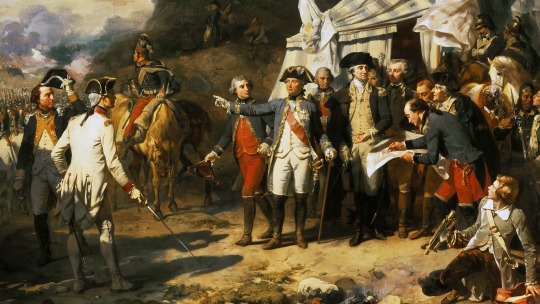

youtube
Link to slides.
More on Yorktown.
Slavery, espionage, intel, & Yorktown.
Further reading.
#fic: anti hero#battle of yorktown#benjamin tallmadge#ben tallmadge#enbylestat#turn washington's spies#turn: washington's spies#turn amc#amc turn#la fayette#18th century#18th century history#american revolution#fan fic related#James armistead Lafayette#historical alexander hamilton#alexander hamilton#marquis de lafayette#george washington#Charles Cornwallis#history#amrev history#amrev#historical fiction#writing historical fiction#historical research#research#research is fun#why am i like this#slavery cw
14 notes
·
View notes
Text
Gundam x 1776
In the Gundam AU of the American War of Independence:
After the British Empire defeats the Congressional forces in the War of 1776, a Neo Congressional strike force destroys half the British Navy during the 1778 fleet review. The British Empire creates a special unit to hunt down the Congressionals: the British Anti-Colonial Kingsmen (BACKers).
The BACKers quickly become known for their cruelty not just towards Congressionals, but all colonials, even in the Empire's loyal colonies. Operating under royal decree, they shun Parliamentary oversight, and sneer at the regular British forces.
George Washington travels to England, takes the name Forth Virginia, and fights against the BACKers, alongside Irish Republicans, remnant Congressionals, the Spanish Treasure Fleet, and the British Empire Forces. The BACKers now seek to capture all Britain for their leader, Napoleon.
When the BACKers are finally defeated during the War of 1812, George returns to America, reclaims his name, and unites the dispersed Congressional forces with a promise of American freedom and independence. Fresh infusions of Spanish treasure and technology give the Congressionals an edge against Britain, for a time.
To realize the Founders' ideological commitment to Colonialism, by forcing all those living in Britain to emirate to the colonies, George and the Newborn Neo Congressionals attack Britain with artificial tsunamis. During Britain's desperate attempt to capture the second wavemaker before its detonation, George goes missing in battle along with his kismesis, Charles Cornwallis. Britain is saved, but is this the end of the Congressional wars?
j/k nope who's that it's ya boy White Smile, who is a vessel into which the spirit of The People is poured, the second coming of the American Fabius! He (or his backers?) seek to cut off Britain from its colonies with the creation of a Colonial Co-Prosperity Sphere, which dies along with White Smile in battle with a young man named Abraham Lincoln.
And who's that, coming in with an exceedingly-pithy revolutionary tract which can only be implemented over more years than England has to count? It's Henry Clinton, son of famous British war leader Sir Henry Clinton, come to overturn his father's legacy!
#quattro bajeena#gundam#shitposting#george washington#charles cornwallis#zeta gundam#double zeta gundam#gundam zz#char's counterattack#mobile suit gundam
5 notes
·
View notes
Text
American Foreign Policy Since 1945
The United States of America, with its founding in 1775 and winning the American Revolution or, more accurately, a British civil war which lasted until 1783 over the 19th 1781 with the surrender of General Lord Charles Cornwallis
The United States of America, with its founding in 1775 and winning the American Revolution or, more accurately, a British civil war which lasted until 1783 over the 19th 1781 with the surrender of General Lord Charles Cornwallis surrendered 7087 officers and 900 seamen hundred and 40 cannons 15 galleys a frigate and 30 transport vessels. During the day of the surrender, General Cornwallis…
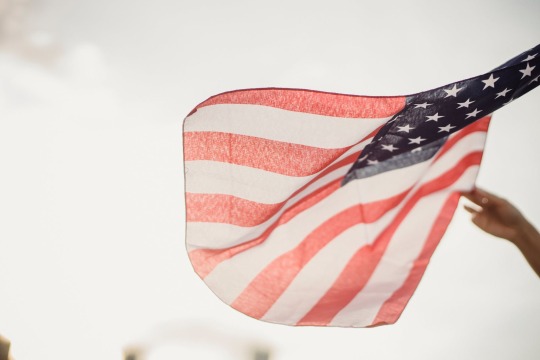
View On WordPress
#America History#American Foreign Policy#American Mexican War#Bill Clinton#Charles CornWallis#Confederate States of America#European History#French Revolutionary War#George H. W. Bush#George Washington#History#Lord Cornwallis#Robert E Lee#Treaty of Paris
1 note
·
View note
Text

British Royal Family - The Queen Mother with her grandson, Prince Charles and Pippin the dog, in an informal photograph taken on a terrace. (Photo by Hulton-Deutsch Collection) | 1954
#royaltyedit#theroyalsandi#queen mother#duke of cornwall#queen elizabeth#prince charles#prince charles duke of cornwall#queen elizabeth queen mother#1954#british royal family#my edit#the queue and i
37 notes
·
View notes
Text
Inside William’s Next Act: Tatler’s May issue goes behind the scenes as the Prince of Wales is rising above the noise — and playing the long game
The burden of leadership is falling upon Prince William, but as former BBC Royal Correspondent, Wesley Kerr OBE, explains in Tatler’s May cover story, the future king is taking charge
By Wesley Kerr OBE
21 March 2024
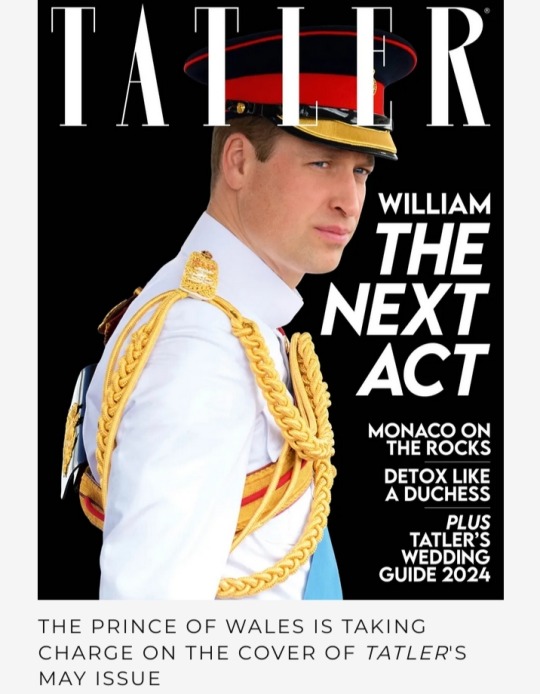
When I first met Prince William in 2009, he asked me if I could tell him how he could win the National Lottery.
It was a jokey quip from someone who has since become the Prince of Wales, the holder of three dukedoms, three earldoms, two baronies and two knighthoods, and heir to the most prestigious throne on earth.
He was, of course, being relatable; I was representing the organisation that had allocated Lottery funding towards the Whitechapel Gallery and he wanted to put me at ease.
William is grand but different, royal but real.
At 6ft 3in, he has the bearing and looks great in uniform after a distinguished, gallant military career.
He will be one of the tallest of Britain’s kings since Edward Longshanks in the 14th century and should one day be crowned sitting above the Stone of Scone that Edward ‘borrowed.’
William, by contrast, has a deep affinity with Scotland and Wales, having lived in both nations and gained solace from the Scottish landscape after his mother died.
He’s popular in America and understands that the Crown’s relationship to the Commonwealth must evolve.
The Prince of Wales has long believed that ‘the Royal Family has to modernise and develop as it goes along, and it has to stay relevant’, as he once said in an interview.
He seeks his own way of being relatable, of benefitting everybody, in the context of an ancient institution undergoing significant challenge and upheaval, as the head of a nation divided by hard times, conflicts abroad, and social and political uncertainty.
We might recognise Shakespeare’s powerful line spoken by Claudius in Hamlet: ‘When sorrows come, they come not single spies, but in battalions.’
With the triple announcement in January and February of the Princess of Wales’s abdominal surgery and long convalescence, of King Charles’s prostate procedure and then of his cancer diagnosis, the burden of leadership has fallen on 76-year-old Queen Camilla and, crucially, on William.
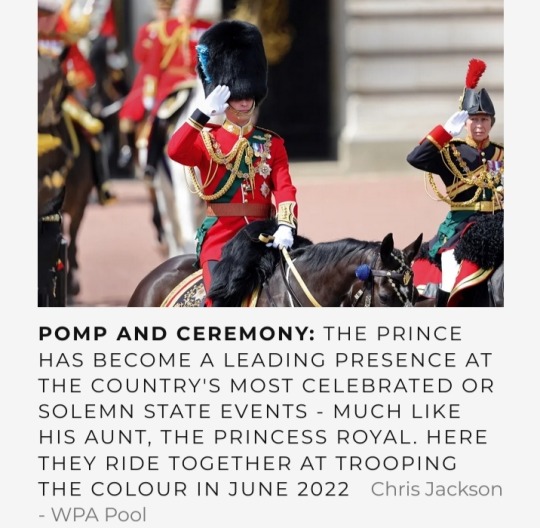
The Prince of Wales’s time has come to step up; and so he has deftly done.
In recent months, we have seen a fully-fledged deputy head of state putting into practice his long-held ideas, speaking out on the most contentious issue of the day and taking direct action on homelessness.
Last June, he unveiled the multi-agency Homewards initiative with the huge aspiration of ending homelessness, backed with £3 million from his Foundation to spearhead action across the UK.
He is consolidating Heads Together, the long-standing campaign on mental health, and fundraises for charities like London’s Air Ambulance Charity.
He was, of course, once a pilot for the East Anglian Air Ambulance services – a profession that had its downside: seeing people in extremis or at death’s door, he found himself ‘taking home people’s trauma, people’s sadness.’
Tom Cruise was a guest at the recent London’s Air Ambulance Charity fundraiser, William’s first gala event after Kate’s operation.
And more stardust followed when William showed that, even without his wife by his side, he could outclass any movie star at the Baftas.
There’s also his immense aim of helping to ‘repair the planet’ itself with his Earthshot Prize: five annual awards of £1 million for transformative environmental projects with worldwide application.
This project has a laser focus on biodiversity, better air quality, cleaner seas, reducing waste and combating climate change. Similar aims to his father; different means to achieve the goal.
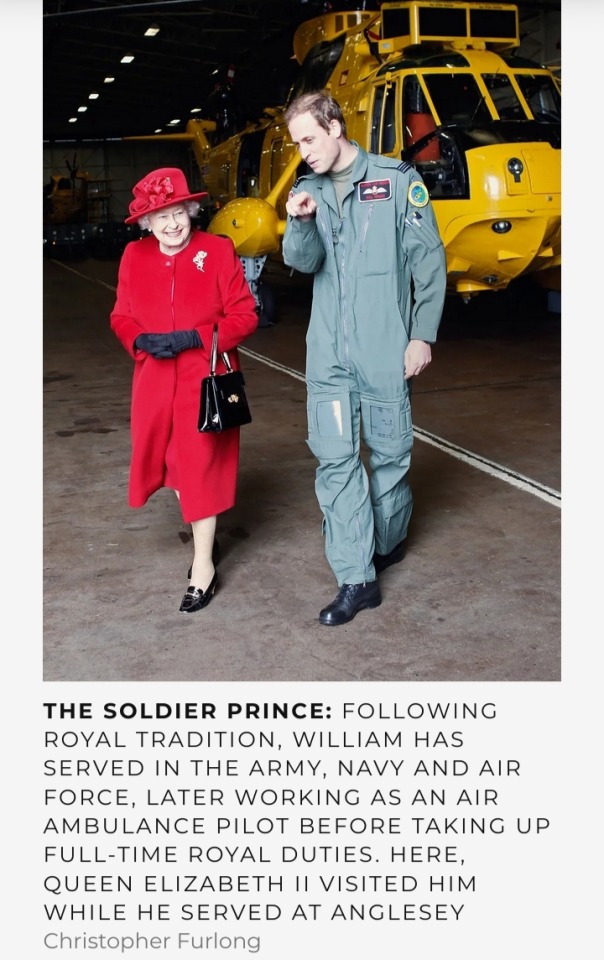
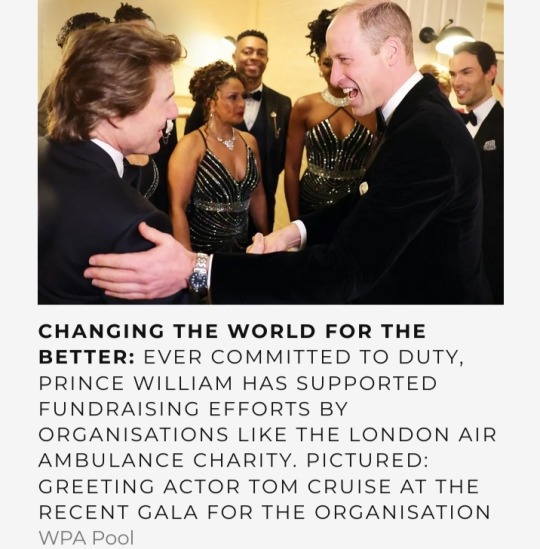
On the issue which has caused huge convulsions – the Middle East conflict – William’s 20 February statement from Kensington Palace grabbed attention.
He said he was ‘deeply concerned about the terrible human cost of the conflict since the Hamas terrorist attack on 7 October. Too many have been killed.’
There were criticisms – along the lines of ‘the late Queen would have never spoken out like this’ or ‘what right does he have to meddle in politics?’ – but it was hard to disagree with his carefully calibrated words.
His call for peace, the ‘desperate need’ for humanitarian aid, the return of the hostages.
The statement was approved by His Majesty’s Government, likely cleared with the King himself at Sandringham the previous weekend and also backed by the chief rabbi of Great Britain, Sir Ephraim Mirvis.
Indeed, William and Catherine had immediately spoken out on the horrors of 7 October.
William followed up the week after his Kensington Palace statement by visiting a synagogue and sending a ‘powerful message’, according to the chief rabbi, by meeting a Holocaust survivor and condemning anti-Semitism.
This is rooted in deep personal conviction following William’s 2018 visit to Israel and the West Bank, says Valentine Low, the distinguished author of Courtiers and The Times’s royal correspondent of 15 years, who was on that 2018 trip.
‘William was so moved by his visit to Israel and the West Bank, he found it very affecting, and he was not going to drop this issue – he was going to pay attention to it for the rest of his life,’ says Low.
‘He must feel that… not to say something on the most important issue in the world [at that moment] would be a bit odd if you feel so strongly about it.’
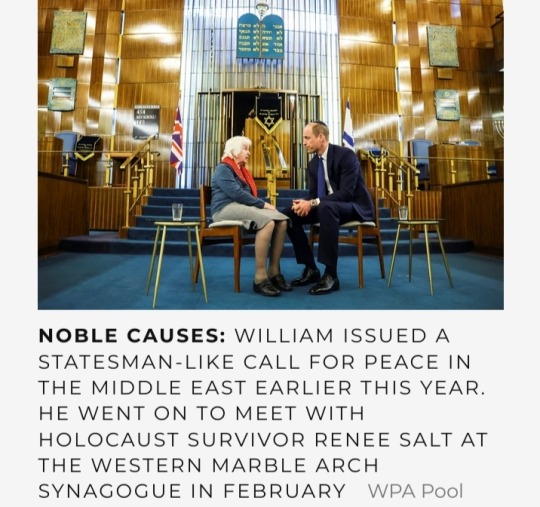
There was concern from some commentators about politicising the monarchy, but this rose above the particulars of party politics.
As Prince of Wales, like his father before him, there is perhaps space to speak out sparingly on carefully chosen issues.
On this occasion, his views were in line with majority public opinion.
On homelessness, news came that same week that William was planning to build 24 homes for the homeless on his Duchy of Cornwall estate.
‘William’s impact is very personal,’ says Mick Clarke, chief executive of The Passage, a charity providing emergency accommodation for London’s homeless.
‘Two weeks before Christmas, the prince came to our Resource Centre in Victoria for a Christmas lunch for 150 people.
He was scheduled to stay for an hour, to help serve, wash up, and talk to people.
He ended up staying for two and a quarter hours, during which time he went from table to table and spoke to every single person.’
Clarke continues:
‘William has an ability to listen, talk and to put people at ease. During the November 2020 lockdown, he came on three separate occasions to help.
It gave the team a boost that he took the time; it was his way of saying: “I support you; you’re doing a great job.”’
Seyi Obakin, chief executive of Centrepoint, one of the prince’s best-known causes, adds:
‘People associate his patronage with the big moments like the time he and I slept under Blackfriars Bridge.
The things that stick with me are smaller in scale and the more profound for it – in quieter moments, away from the cameras, where he has volunteered his time.’
It is a different approach from the King’s.
As Prince of Wales, he was involved in the minutiae of dozens of issues at any one time, working into the night to follow up on emails, crafting his speeches, writing or dictating notes.
Add to that much nationwide touring over 40 years (after he left active military service in 1976), fitting in multiple engagements, often being greeted formally by lord lieutenants.
This is not William’s style. He has commended his father’s model, but he does things his own way.
Although patronages are under review, William has up till now far fewer than either his father or his grandparents.
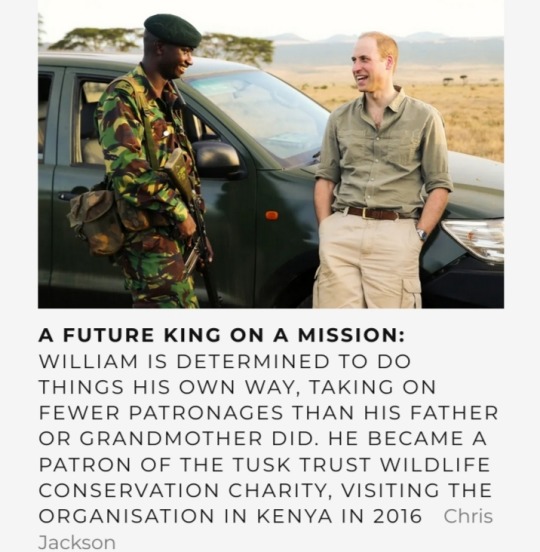
Charles is sympathetic to William’s approach and his desire to make time with his young family sacrosanct.
They are confidantes, attested by the night of Queen Elizabeth’s death.
They were both at Birkhall with Camilla, reviewing funeral arrangements while the rest of the grieving family were nearby at Balmoral, hosted by the Princess Royal.
Charles has had almost six decades in public life and is the senior statesman of our time, with even longer in the spotlight than Joe Biden.
After Eton and St Andrew’s University, where he met Catherine, William served in three branches of the military between 2006 and 2013, finishing as a seasoned and skilled helicopter rescue pilot.
His later employment as an air ambulance pilot stopped in 2017, when he became a full-time working royal.
At that time, not so long ago – with Harry unmarried, Andrew undisgraced, and Philip and Elizabeth still active – William shared the spotlight.
Now, after the King, he’s the key man.
He can look back on the success of his first big campaign initially launched with his wife and brother in 2016: Heads Together.
‘We are delighted that Prince William should have become such a positive and sympathetic advocate for mental health through his Heads Together initiative and now well-established text service, Shout, among other projects,’ says the longtime CEO and founder of Sane, the remarkable Marjorie Wallace CBE.
‘It is not always known that he follows in the footsteps of his father, the King, whose inspiration and vision were vital in the creation of our mental health charity Sane.
As founding patron, he was instrumental in establishing our 365-days-a-year helpline and was a remarkable and selfless support to me in setting up the Prince of Wales International Centre for Sane Research.’
'Indeed,' says Wallace, 'this is where Prince William echoes the work of his father, showing the same ‘understanding and compassion for people struggling through dark and difficult times of their lives and has done much to raise awareness and encourage those affected to speak out and seek help.
We owe a huge debt to His Majesty and the Prince of Wales for their involvement in this still-neglected area.’
Just as I saw all those years ago at that early solo engagement in Whitechapel, William still approaches his public duties with humour and fun.
‘He defuses the formality with jocularity,’ says Valentine Low, citing two public events in 2023 that he witnessed.
In April last year, while on a visit to Birmingham, William randomly answered the phone in an Indian restaurant he was being shown around and took a table booking from a customer – an endearing act of spontaneity.
On his arrival later that day, the unsuspecting diner was surprised to be told exactly whom he had been talking to.
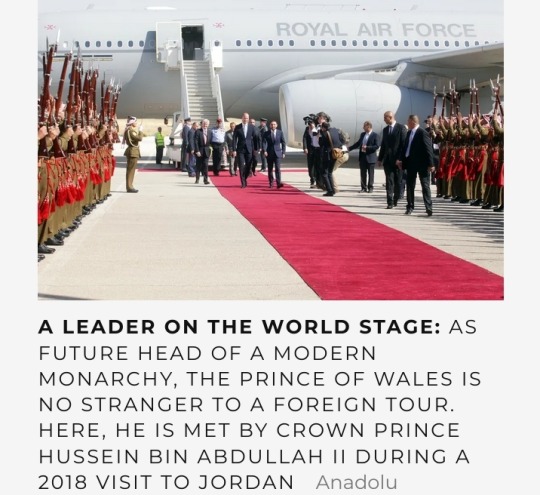
In October, Low reported, William ‘unleashed his inner flirt as he hugged his way through a visit with Caribbean elders [in Cardiff] to mark Black History Month.
As he gave one woman a hug – for longer than she expected – he joked: “I draw the line at kissing.”
And while posing for a group photograph, he prompted gales of laughter when he quipped: “Who is pinching my bottom?”’
Low believes that when William eventually becomes king, he will be more ‘radical’ than his father but wonders if people will respond to ‘call me William’ when ‘the whole point of the Royal Family is mystique and being different.’
However, William has thought deeply about his current role and is prepared for whatever his future holds.
For now, there is a decision to be made on Prince George’s secondary schooling. It’s said that five public schools are being considered, all fee-paying.
Eton is single-sex and boarding but close to home. Marlborough (Catherine’s alma mater) is co-ed and full boarding. And Oundle, St Edward’s Oxford and Bradfield College (close to Kate’s parents) are co-ed with a mix of boarding and day.
As parents, William and Catherine aspire to raise their children ‘as good people with the idea of service and duty to others as very important’, William said in an interview with the BBC in 2016.
‘Within our family unit, we are a normal family.’ Which may be one reason why he is so resistant to their privacy being compromised either by the media or close family members.
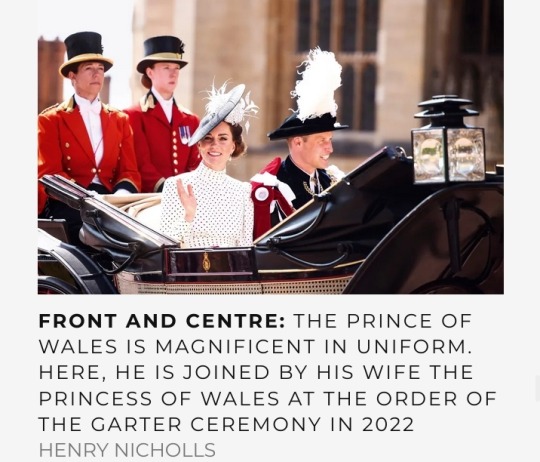
The 19th-century author Walter Bagehot wrote:
‘A family on the throne is an interesting idea also. It brings down the pride of sovereignty to the level of petty life… a princely marriage is the brilliant edition of a universal fact, and, as such, it rivets mankind.’
If hereditary monarchy is to survive, it must beguile us but also demonstrate its utility, that it is a force for good.
William said in that 2016 interview, ‘I’m going to get plenty of criticism over my lifetime,’ echoing Queen Elizabeth II’s famous Guildhall speech in 1992 ‘that criticism is good for people and institutions that are part of public life. No institution – city, monarchy, whatever – should expect to be free from the scrutiny of those who give it their loyalty and support, not to mention those who don’t.’
William saw close up his mother’s ability to bring public focus and her own personal magnetism to any subject or cause she focused on.
He admires his father’s work ethic, the way he ‘really digs down,’ sometimes literally (I understand that gardening is giving the King solace during his cancer treatment).
But the biggest influence for William was Her late Majesty, as he said on her 90th birthday.
As an Eton schoolboy, William made weekend visits to the big house on the hill, being mentored by Granny rather as she had been tutored in the Second World War by the then vice-provost of Eton, Sir Henry Marten.
William said in 2016:
‘In the Queen, I have an extraordinary example of somebody who’s done an enormous amount of good and she’s probably the best role model I could have.’
That said, his aim was ‘finding your own path but with very good examples and guidance around you to support you.'
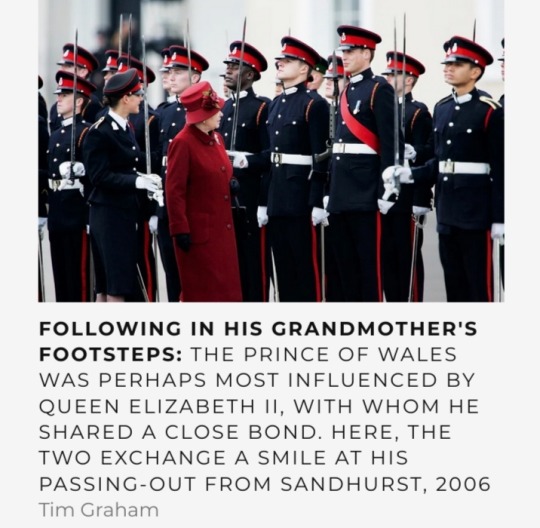
Queen Elizabeth II had a brilliant way of rising above the fray and usually being either a step ahead of public opinion or in tune with it.
If you are at the helm of affairs in a privileged hereditary position, your duty is to serve and use your pulpit for the benefit of others.
In a democracy, monarchy is accountable.
The scrutiny is intense, with an army of commentators paid for wisdom and hot air about each no-show, parsing each announcement, interpreting each image.
William takes the long view. He has ‘wide horizons,’ says Mick Clarke.
‘There are so many causes that are more palatable and easier to achieve than ending homelessness, but his commitment and drive are 100 per cent.’
The prince seeks a different way of being royal in an ancient institution that must move with the times. His task? To develop something modern in an ever-changing world.
He faces all sorts of new issues – or old issues in new guises.
Noises off from within the family don’t help – Andrew’s difficulties, or the suggestions of prejudice from Montecito a couple of years ago (now seemingly withdrawn), which prompted William’s most vehement soundbite: ‘We’re very much not a racist family.’
William is maybe a new kind of leader who can keep the monarchy relevant and resonant in the coming decades.
Queen Elizabeth II is a powerful exemplar and memory, but she was of her time. William is his own man.
He must overcome and think beyond ‘the unforgiving minute.’
Indeed, he could seek inspiration in Rudyard Kipling’s poem, If.
If you can force your heart and nerve and sinew
To serve your turn long after they are gone,
And so hold on when there is nothing in you
Except the Will which says to them: ‘Hold on!’
If you can talk with crowds and keep your virtue,
Or walk with Kings—nor lose the common touch[…]
Yours is the Earth and everything that’s in it,
And—which is more—you’ll be a Man, my son!
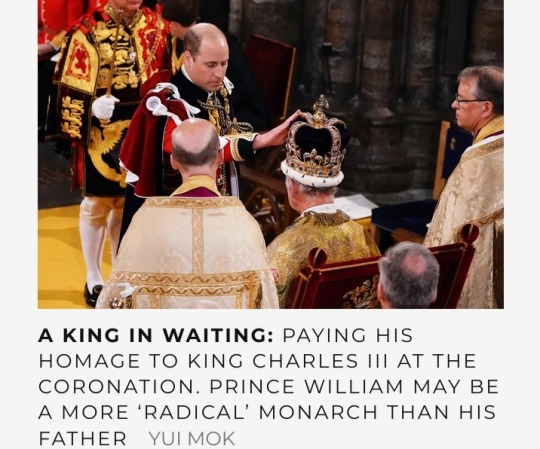
This article was first published in the May 2024 issue, on sale Thursday, 28 March.
#Prince William#Prince of Wales#British Royal Family#Wesley Kerr OBE#Edward Longshanks#Homewards#Heads Together#London’s Air Ambulance Charity#East Anglian Air Ambulance#Tom Cruise#BAFTAS#Earthshot Prize#Kensington Palace#King Charles III#Sir Ephraim Mirvis#Valentine Low#Duchy of Cornwall estate#The Passage#Centrepoint#Birkhall#Sane#Marjorie Wallace CBE#Shout#Balmoral#Prince George#Walter Bagehot#Sir Henry Marten#Rudyard Kipling#If
149 notes
·
View notes
Text
Power, Coercion, and Seduction
One of the most bizarre popular interpretations of The Patriot for me is the idea that Colonel Tavington forces Benjamin Martin to become involved in the Patriot war effort when he targets his family. This reading presents Martin's violence as merely a reaction to Tavington's choices. What it overlooks is not only that Martin has agency, but he has more than anyone else in the story. That agency should come with some responsibility; instead, all responsibility for Martin's violence within the narrative falls on the shoulders of a man who has to ask his general for permission to terrorize civilians in the film's third act. For all the pearl-clutching over Tavington killing surrendering soldiers first, he is also the only officer in the film to take prisoners, which only happens because General Cornwallis ordered him to give quarter. Do we not think he would have been torturing civilians for information about The Ghost before the militia was even trained if Cornwallis had allowed it?
People often use Tavington's desire for power to contrast him unfavorably with Martin, but Martin has no lack of power to produce a craving. Colonel Harry Burwell gives him orders when he puts him in charge of the militia, but he follows or does not follow them based on his whims. He allows his men to murder surrendering soldiers until his son and subordinate calls out his hypocrisy. His orders are to target supply trains, but he uses his force to rescue his own children and attempts to do the same for his friend, John Billings' family. When they fail, he gives his men a week's furlough and marries off his son, all while the Continental Army is planning a major engagement with the enemy. Either Martin has extremely poor communication with the Army, which the film never addresses, or he is simply a law unto himself. While Tavington languishes in impotence because his general will not allow him the brutal tactics that ultimately prove so effective, Martin is riding around doing exactly as he pleases, the Ron Swanson of the American Revolution.
He even makes plans to leave on the eve of battle after Gabriel's death, and all Burwell can do is plead with him in the words of his late wife to "stay the course," that his men need him and . . .
That's desertion, Harold. If one of your Regular officers tried that, you'd court martial him. Clearly, no one can make Martin do anything he does not want to do, least of all Tavington.
Since Tavington actually is subject to the authority of his superior officers, he is reliant on seduction and manipulation to get what he wants. In the case of Cornwallis, he offers the general glory free from consequence, a tall order that he definitely cannot fill . He gets what he wants from Captain Wilkins, who is under his orders, not by threatening him but by appealing to his desire to save face. Wilkins said those who stood against England deserved to die traitors' deaths; Tavington frames himself as giving him the opportunity to prove it, and it works. Burning the Patriot civilians in Pembroke Church is Wilkins' choice like granting Tavington carte blanche is Cornwallis's choice.
Coercion compels a person to do something against their desires; seduction gives a person permission to act on desires already present. When Tavington murders Thomas, he does not transform Martin from a pacifist to a man for whom violence is the only option in that moment. Martin already has a stockpile of weapons in waiting. He knows exactly where to find his French and Indian War buddies, and he has better battle plans than any of the Continental generals. When it comes to violence, Benjamin Martin stays ready.
I would argue that killing Martin's sons is an act of seduction as well as an incitement to violence, but as is the case with the other two men, these acts have only as much power as Martin gives them. The face-off in which Martin tells Tavington "Before the war is over I am going to kill you" and Tavington replies "why wait?" represents another attempt on Tavington's part to seduce Martin into violence, but this time he fails. In a later scene, cut from the theatrical release, he tries and fails to seduce Cornwallis into assuring his reward, and the two scenes share striking visual similarities. Both feature over the shoulder shots that position the two men far closer than they need to be for the purpose of conversation. The scene with Cornwallis is more on the nose. Tavington's shirt is open, his hair is loose, the orderly leaves without bidding as the two draw closer, almost as though similar scenes have played out between them recently that had very different endings to this one. But there is no lack of heat between Martin and Tavington at the gate of Fort Carolina, particularly compared to the single seduction scene that actually precipitates sex, between Ben and Charlotte. Yikes.
Neither Martin nor Cornwallis gives in to Tavington's seduction in these scenes, which should reinforce that they are in charge of their own behavior and thus culpable for their choices. And to the extent that blame for the British defeat falls on anyone but Tavington, it falls on Cornwallis. That seems fair enough; he is the general of the British Army in the southern colonies. But when the blame for Martin's poor choices somehow also falls on Tavington . . . the story loses me. But I suppose that is part of the fantasy for the film's intended audience. Martin gets the benefit of both ultimate authority over his actions and complete immunity to their consequences. Perhaps he should have run against George Washington given that these are the very qualities some Americans seem to look for in a president.
#the patriot#benjamin martin#william tavington#charles cornwallis#james wilkins#actions and consequences#seduction vs coercion
13 notes
·
View notes
Text
*insert I want those hot dandies obliterated meme directed at, André, Cornwallis, Tallmadge, and Hamilton*




Also from @thebaffledcaptain / @iamthemaestro:

Re: Dandyism
The inherent problem with the “foncy poncy oppressive English narrative” that is definitely historical revisionism.
1) anyone who was anyone in the 18th century (Hamilton, Tallmadge, Major André, Washington’s other aides to camp and the British generals) would’ve both presented as a “dandy” it was a symbol of status and being cultured and/or well read.
2) imperialism cuts both ways and both sides brutalized and lied to black and indigenous folks. Don’t get me, a brown person, started on the British Raj. (Reading 1) (reading 2)
youtube
youtube
youtube
youtube
Prompted by this post also I highly recommend The Vampire Lestat, Tallmadge’s memoir, the scarlet pimpernel, and dangerous liaisons.
#18th century#american revolution#dandyism#dandy#queer culture#anti imperialism#Alexander Hamilton#benjamin tallmadge#ben tallmadge#john andre#major john andre#Charles Cornwallis#i want that twink obliterated#long post tw#/hj#long post
201 notes
·
View notes
Text






British Royal Family | “Let us not take ourselves too seriously. None of us has a monopoly on wisdom.” - Queen Elizabeth II (1926 - 2022).
#ktd#british royal family#brf#throwback#queen elizabeth ii#queen elizabeth the queen mother#princess Diana#princess Catherine#Duchess of Cambridge#duchess of cornwall#Prince Philip#Prince Charles
22 notes
·
View notes
Text

20 May 2013 | Prince Charles, Prince of Wales, Prince Philip, Duke of Edinburgh, Prince Harry and Camilla, Duchess of Cornwall visit the Sentebale Forget-me-not garden, at the Chelsea Flower Show press and VIP preview day at Royal Hospital Chelsea in London, England. (c) Geoff Pugh - WPA Pool/Getty Images
#Prince Philip#Duke of Edinburgh#Prince Harry#Duke of Sussex#Camilla#Duchess of Cornwall#Queen Camilla#Prince Charles#Prince of Wales#King Charles III#Britain#2013#Geoff Pugh#WPA Pool#Getty Images
13 notes
·
View notes